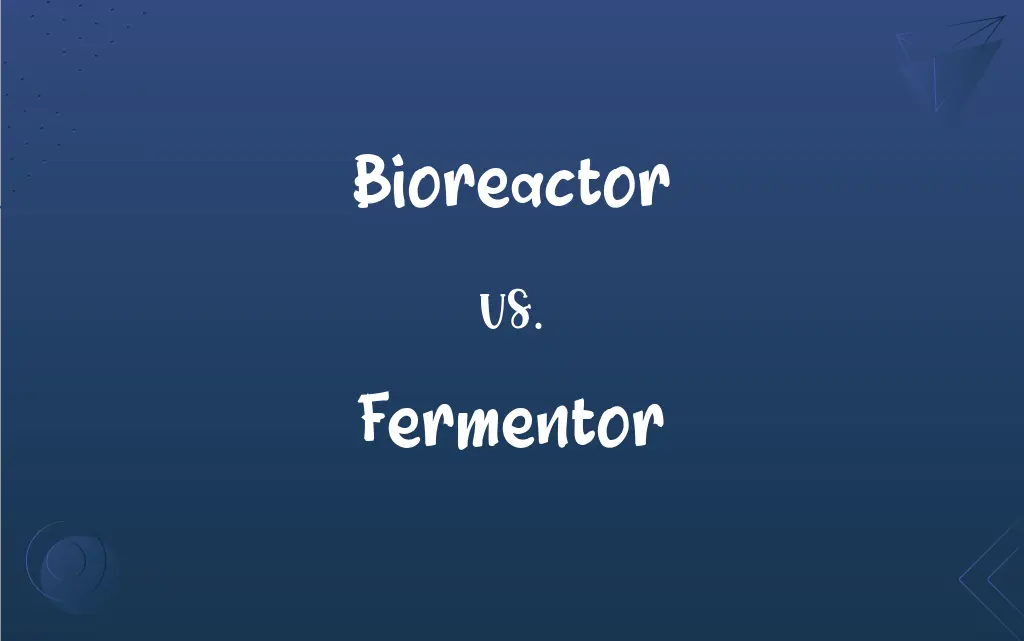Bioreactor vs. Fermentor: What's the Difference?
Edited by Aimie Carlson || By Harlon Moss || Published on December 23, 2023
Bioreactors are vessels used for bioprocesses involving organisms or biochemically active substances; fermentors are specifically designed for fermentation processes.

Key Differences
A bioreactor is a controlled environment designed for cultivating organisms or cells in bioprocessing. It supports a range of biological reactions, including fermentation, but is not limited to this process. A fermentor, on the other hand, is specifically used for fermentation, a metabolic process where microorganisms convert sugars to acids, gases, or alcohol. While both are used in biochemical processes, the scope of a bioreactor is broader.
The design of bioreactors is versatile, catering to different types of bioprocesses, including cellular and tissue cultures. They can control factors like temperature, pH, oxygen, and nutrient supply. Fermentors, in contrast, are tailored for optimal fermentation conditions. They ensure the ideal environment for microbial growth and product formation, often focusing on anaerobic conditions.
Bioreactors are pivotal in various industries, including pharmaceuticals, where they are used for drug development and production. Their adaptability allows them to support complex biological reactions. Fermentors are widely used in the food and beverage industry, primarily in processes like brewing and yogurt production, where fermentation is the key reaction.
In terms of technology, bioreactors can be advanced, incorporating sophisticated monitoring and control systems to maintain precise conditions. Fermentors, while also technically equipped, usually have a more focused scope on maintaining conditions favorable for fermentation, such as temperature and anaerobic environment.
Comparison Chart
Primary Function
Supports a variety of bioprocesses
Specifically designed for fermentation
ADVERTISEMENT
Usage Industries
Broad, including pharmaceuticals, bioengineering
Primarily food and beverage, like brewing
Control Parameters
Temperature, pH, oxygen, nutrients
Temperature, anaerobic conditions
Process Scope
Includes fermentation, cellular cultures, tissue engineering
Limited to fermentation processes
Technological Complexity
Often more sophisticated, with advanced monitoring systems
Focused on fermentation-specific conditions
Bioreactor and Fermentor Definitions
Bioreactor
A bioreactor enables biochemical processes for industrial or research purposes.
A bioreactor was essential for producing enzymes in the lab.
ADVERTISEMENT
Fermentor
Fermentors provide an anaerobic environment for microbial fermentation processes.
Cheese production in the fermentor relies on controlled fermentation.
Bioreactor
A bioreactor is a vessel for growing cells or microbes in controlled conditions.
Scientists used a bioreactor to cultivate stem cells for medical research.
Fermentor
Fermentors are integral in food processing for converting sugars into alcohol or acids.
A fermentor is used for converting milk into yogurt through fermentation.
Bioreactor
Bioreactors are used in waste treatment to break down organic matter.
The treatment plant uses a bioreactor to process sewage water.
Fermentor
A fermentor is a vessel used for fermenting substances like beer or yogurt.
The brewery has a large fermentor for beer production.
Bioreactor
Bioreactors facilitate the controlled growth of tissue for regenerative medicine.
The lab-grown organ was developed in a bioreactor.
Fermentor
Fermentors are used in the biotechnology industry to produce fermented products.
The new fermentor enhances the efficiency of the fermentation process.
Bioreactor
Bioreactors support the production of biofuels through microbial activity.
Algae grown in a bioreactor can be used for biofuel production.
Fermentor
Fermentors maintain specific conditions optimal for fermentation reactions.
Temperature and pH in the fermentor are crucial for quality wine.
Bioreactor
An apparatus, such as a fermentation chamber, for growing organisms such as bacteria or yeast that are used in the biotechnological production of substances such as pharmaceuticals, antibodies, or vaccines, or for the bioconversion of organic waste.
Fermentor
An organism that causes fermentation.
Bioreactor
(biochemistry) A fermentation vat, containing microorganisms or biochemically active substances, used for waste recycling or for making drugs.
Fermentor
Also fer·men·tor An apparatus that maintains optimal conditions for the growth of microorganisms, used in large-scale fermentation and in the commercial production of antibiotics and hormones.
Bioreactor
An apparatus in which a suspension of microorganisms in a liquid are used to perform chemical reactions, as in synthesis of pharmaceutical agents or the conversion of harmful waste to less harmful substances. The reactor consists of a vessel to contain the suspension of microorganisms, plus a variety of attached devices used to control the reaction.
Fermentor
The vessel in which fermentation takes place
FAQs
What is a bioreactor?
A vessel for bioprocesses involving living organisms or bioactive substances.
Are fermentors limited to food and beverage industries?
Mostly, but they're also used in biotech for specific fermentation products.
Is temperature control important in fermentors?
Yes, it's crucial for maintaining optimal fermentation conditions.
Can fermentors be used for producing biofuels?
Not typically, as they are specialized for food-related fermentation.
Can bioreactors be used for fermentation?
Yes, they are versatile and can support fermentation among other processes.
What makes bioreactors different in terms of design?
They are designed to cater to a variety of bioprocesses, not just fermentation.
Can bioreactors be used for tissue engineering?
Yes, they support complex processes like tissue and cell culture.
Are bioreactors used in pharmaceuticals?
Yes, for drug development and production using bioprocesses.
What is a fermentor used for?
Specifically for fermentation processes, like brewing or cheese making.
Do fermentors control factors like pH and oxygen?
Yes, but primarily to optimize fermentation conditions.
Can bioreactors produce vaccines?
Yes, they're used in cultivating cells for vaccine production.
Do bioreactors require sophisticated technology?
Often, they incorporate advanced monitoring and control systems.
Are fermentors used in waste treatment?
Rarely, as they are more specialized for food and beverage production.
Do fermentors vary in size?
Yes, they range from small lab-scale to large industrial fermentors.
Do bioreactors require specialized operators?
Yes, operating a bioreactor typically requires trained personnel.
Are bioreactors adaptable for different scale operations?
Yes, they can be designed for various scales, from lab to industrial.
Is anaerobic environment a key factor in fermentors?
Yes, it's essential for many fermentation processes.
Can fermentors be automated?
Yes, modern fermentors often include automation for process control.
Are bioreactors used in environmental applications?
Yes, especially in waste treatment and bio-remediation.
Are fermentors easy to clean and sterilize?
Yes, they are designed for easy cleaning to prevent contamination.
About Author
Written by
Harlon MossHarlon is a seasoned quality moderator and accomplished content writer for Difference Wiki. An alumnus of the prestigious University of California, he earned his degree in Computer Science. Leveraging his academic background, Harlon brings a meticulous and informed perspective to his work, ensuring content accuracy and excellence.
Edited by
Aimie CarlsonAimie Carlson, holding a master's degree in English literature, is a fervent English language enthusiast. She lends her writing talents to Difference Wiki, a prominent website that specializes in comparisons, offering readers insightful analyses that both captivate and inform.
































































